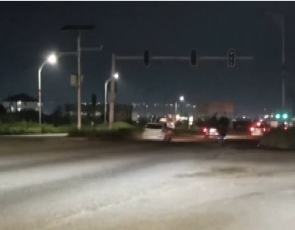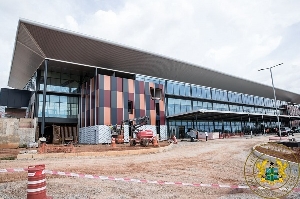General News of Monday, 13 January 2003
Source: Ghanaian Chronicle
Drug trade zooms, but ..
Latest information gathered from the Narcotics Control Board (NCB), Ghana, indicates that about 28,865kg of narcotic drugs worth millions of dollars in street value have been confiscated in a matter of five years.
In particular, the importation of cocaine, that powerful addicting drug, which doctors sometimes use as anaesthetic, has shot up from 5.3kg in 1998 to 10.41kg in the third quarter of last year, representing almost an increase of 98 per cent.
A total of 3,877 people have been arrested for dabbling in the drug business over the same period. Out of the figure for illicit drugs confiscated, 31kg were cocaine, 69kg were heroine and 28.765kg were cannabis.
The production of cannabis (wee) has risen from 4,376kg in 1998 over the years to 8,758kg in 2000. It however subsided to 7,286kg the following year and further increased to 4,265kg the third quarter of last year.
Likewise, the importation of heroin which is made from morphine has increased over the years; from 1998, when the figure was 18kg, it showed upward trend to 21kg in 1999, then reduced to 8kg in 2000, but again the figure shot up to 13kg as at the end of the third quarter of last year.
The only comforting development is that the number of people who are involved in the drug importation and exportation businesses have reduced over the same period. The figure reduced sharply to 754 people in the third quarter of last year from 1,042 people in 2001.
Disclosing this in an interview with the Chronicle, the Executive Secretary of the NCB, Col I.K. Akuoko, named the leading towns where cannabis is mostly cultivated as Nsukaw, Nkonya and Mangoase all in the Volta Region and Essem in the Eastern Region.
He added, “cocaine and heroine are transit drugs from the source countries of South Africa and Southeast and West Asia and over the years, the drugs developed a spillover that has created consumption locally.”
According to Col Akuoku, the decrease in the number of people who are involved in the drug could be attributed to the aggressiveness of the board, with the help of the police and some members of the public.
He said some of the areas where the drugs are mostly transacted have been dealt with and this has scared other traffickers to refrain from the business. Col Akuoku stated that the board would not relent its effort to determine the most effective ways of controlling this menace and the society.
He commended non-governmental organisations in their efforts at educating the general public, particularly, the youth, workers, parents and law enforcers, on the harmful effects of drug abuse so that these persons who are not involved in the drug business would be sensitised to the need to a drug-free life.
He called on the public to help the activities of the board by providing information that could lead to the arrest of drug traffickers from their hide-outs but not to be scared to because they would be protected at all cost.
Opinions











